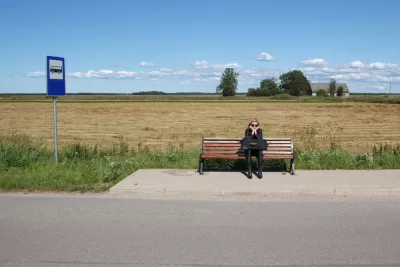Vast distances and inadequate funding pose problems for the rural transportation services that older adults rely on to access essential services.

Transportation in rural America is often hard to access for older adults, writes Deon J. Hampton for NBC News. “Millions of older adults living in rural America no longer drive and don’t have adequate access to alternative transportation that can assist them with rides to banks, pharmacies and other important places, said Baruch Feigenbaum, senior managing director for transportation policy at the Reason Foundation.”
Despite an additional $2 billion in federal funding allocated to rural transit, many elderly Americans in rural areas will still face transportation challenges, writes Hampton. While nonprofit organizations work to fill the gap, many lack adequate funding and can only operate minimal services.
“One way to make rural transit more accessible for older adults nationwide — including those who are disabled or have low incomes — is to use various forms of federal funding to dole out more grant money for nonprofit organizations like the Rural Transit Service in New York, transportation experts say.” Rural Transit Service has been hailed as a “national model for what an organization can do with the right resources,” writes Hampton.
“Some transit experts reiterated that rural America is just too vast to completely lean on those types of alternative transit systems for the majority of older adults in remote places,” but increased funding can boost programs that already provide low-cost, on-demand services.
FULL STORY: Transportation gaps may persist for rural older adults despite infrastructure dollars

Planetizen Federal Action Tracker
A weekly monitor of how Trump’s orders and actions are impacting planners and planning in America.

Chicago’s Ghost Rails
Just beneath the surface of the modern city lie the remnants of its expansive early 20th-century streetcar system.

San Antonio and Austin are Fusing Into one Massive Megaregion
The region spanning the two central Texas cities is growing fast, posing challenges for local infrastructure and water supplies.

Since Zion's Shuttles Went Electric “The Smog is Gone”
Visitors to Zion National Park can enjoy the canyon via the nation’s first fully electric park shuttle system.

Trump Distributing DOT Safety Funds at 1/10 Rate of Biden
Funds for Safe Streets and other transportation safety and equity programs are being held up by administrative reviews and conflicts with the Trump administration’s priorities.

German Cities Subsidize Taxis for Women Amid Wave of Violence
Free or low-cost taxi rides can help women navigate cities more safely, but critics say the programs don't address the root causes of violence against women.
Urban Design for Planners 1: Software Tools
This six-course series explores essential urban design concepts using open source software and equips planners with the tools they need to participate fully in the urban design process.
Planning for Universal Design
Learn the tools for implementing Universal Design in planning regulations.
planning NEXT
Appalachian Highlands Housing Partners
Mpact (founded as Rail~Volution)
City of Camden Redevelopment Agency
City of Astoria
City of Portland
City of Laramie





























